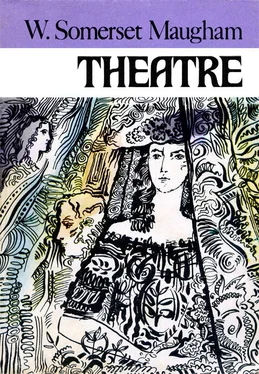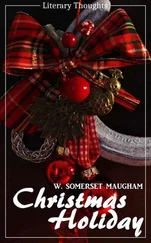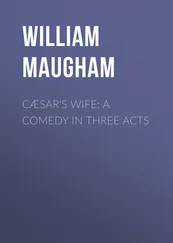‘England would have lost its greatest actress. I know now how dreadfully selfish it was of me ever to propose it.’
‘Success isn’t everything. I sometimes wonder whether to gratify my silly little ambition I didn’t miss the greatest thing in the world. After all, love is the only thing that matters.’ And now she looked at him again with eyes more beautiful than ever in their melting tenderness. ‘D’you know, I think that now, if I had my time over again, I’d say take me.’
She slid her hand down to take his. He gave it a graceful pressure.
‘Oh, my dear.’
‘I’ve so often thought of that dream villa of ours. Olive trees and oleanders and the blue sea. Peace. Sometimes I’m appalled by the dullness and vulgarity of my life. What you offered was beauty. It’s too late now, I know; I didn’t know then how much I cared for you, I never dreamt that as the years went on you would mean more and more to me.’
‘It’s heavenly to hear you say that, my sweet. It makes up for so much.’
‘I’d do anything in the world for you, Charles. I’ve been selfish. I’ve ruined your life, I didn’t know what I was doing.’
Her voice was low and tremulous and she threw back her head so that her neck was like a white column. Her décolleté showed part of her small firm breasts and with her hands she pressed them forward a little.
‘You mustn’t say that, you mustn’t think that,’ he answered gently. ‘You’ve been perfect always. I wouldn’t have had you otherwise. Oh my dear, life is so short and love is so transitory. The tragedy of life is that sometimes we get what we want. Now that I look back on our long past together I know that you were wiser than I. “What leaf-fringed legend haunts about thy shape?” Don’t you remember how it goes? “Never, never canst thou kiss, though winning near the goal—yet, do not grieve; she cannot fade, though thou hast not thy bliss. For ever wilt thou love, and she be fair!”’
(‘Idiotic.’) ‘Such lovely lines,’ she sighed. ‘Perhaps you’re right. Heigh-ho.’
He went on quoting. That was a trick of his that Julia had always found somewhat tiresome.
‘Ah, happy, happy boughs! that cannot shed
Your leaves, nor ever bid the Spring adieu;
And, happy melodist, unwearied,
For ever piping songs for ever new!…’
It gave Julia an opportunity to think. She stared in the unlit fire, her gaze intent, as though she were entranced by the exquisite beauty of those words. It was quite obvious that he just hadn’t understood. It could hardly be wondered at. She had been deaf to his passionate entreaties for twenty years, and it was very natural if he had given up his quest as hopeless. It was like Mount Everest; if those hardy mountaineers who had tried for so long in vain to reach the summit finally found an easy flight of steps that led to it, they simply would not believe their eyes: they would think there was a catch in it. Julia felt that she must make herself a little plainer; she must, as it were, reach out a helping hand to the weary pilgrim.
‘It’s getting dreadfully late,’ she said softly. ‘Show me your new drawing and then I must go home.’
He rose and she gave him both her hands so that he should help her up from the sofa. They went upstairs. His pyjamas and dressing-gown were neatly arranged on a chair.
‘How well you single men do yourselves. Such a cosy, friendly bedroom.’
He took the framed drawing off the wall and brought it over for her to look at under the light. It was a portrait in pencil of a stoutish woman in a bonnet and a low-necked dress with puffed sleeves. Julia thought her plain and the dress ridiculous.
‘Isn’t it ravishing?’ she cried.
‘I knew you’d like it. A good drawing, isn’t it?’
‘Amazing.’
He put the little picture back on its nail. When he turned round again she was standing near the bed with her hands behind her back, a little like a Circassian slave introduced by the chief eunuch to the inspection of the Grand Vizier; there was a hint of modest withdrawal in her bearing, a delicious timidity, and at the same time the virgin’s anticipation that she was about to enter into her kingdom. Julia gave a sigh that was ever so slightly voluptuous.
‘My dear, it’s been such a wonderful evening. I’ve never felt so close to you before.’
She slowly raised her hands from behind her back and with the exquisite timing that came so naturally to her moved them forwards, stretching out her arms, and held them palms upward as though there rested on them, invisibly, a lordly dish, and on the dish lay her proffered heart. Her beautiful eyes were tender and yielding and on her lips played a smile of shy surrender.
She saw Charles’s smile freeze on his face. He had understood all right.
(‘Christ, he doesn’t want me. It was all a bluff.’) The revelation for a moment staggered her. (‘God, how am I going to get out of it? What a bloody fool I must look.’)
She very nearly lost her poise. She had to think like lightning. He was standing there, looking at her with an embarrassment that he tried hard to conceal. Julia was panic-stricken. She could not think what to do with those hands that held the lordly dish; God knows, they were small, but at the moment they felt like legs of mutton hanging there. Nor did she know what to say. Every second made her posture and the situation more intolerable.
(‘The skunk, the dirty skunk. Codding me all these years.’)
She did the only thing possible. She continued the gesture. Counting so that she should not go too fast, she drew her hands towards one another, till she could clasp them, and then throwing back her head, raised them, very slowly, to one side of her neck. The attitude she reached was as lovely as the other, and it was the attitude that suggested to her what she had to say. Her deep rich voice trembled a little with emotion.
‘I’m so glad when I look back to think that we have nothing to reproach ourselves with. The bitterness of life is not death, the bitterness of life is that love dies. (She’d heard something like that said in a play.) If we’d been lovers you’d have grown tired of me long ago, and what should we have now to look back on but regret for our own weakness? What was that line of Shelley’s that you said just now about fading?’
‘Keats,’ he corrected. ‘“She cannot fade though thou hast not thy bliss.”’
‘That’s it. Go on.’
She was playing for time.
‘“For ever wilt thou love, and she be fair.”’
She threw her arms wide in a great open gesture and tossed her curly head. She’d got it.
‘It’s true, isn’t it? “For ever wilt thou love and I be fair.” What fools we should have been if for a few moments’ madness we had thrown away the wonderful happiness our friendship has brought us. We have nothing to be ashamed of. We’re clean. We can walk with our heads held high and look the whole world in the face.’
She instinctively felt that this was an exit line, and suiting her movements to the words, with head held high, backed to the door and flung it open. Her power was such that she carried the feeling of the scene all the way down the stairs with her. Then she let it fall and with the utmost simplicity turned to Charles who had followed her.
‘My cloak.’
‘The car is there,’ he said as he wrapped it round her. ‘I’ll drive you home.’
‘No, let me go alone. I want to stamp this hour on my heart. Kiss me before I go.’
She held up her lips to him. He kissed them. But she broke away from him, with a stifled sob, and tearing open the door ran to the waiting car.
When she got home and stood in her own bedroom she gave a great whoof of relief.
Читать дальше











